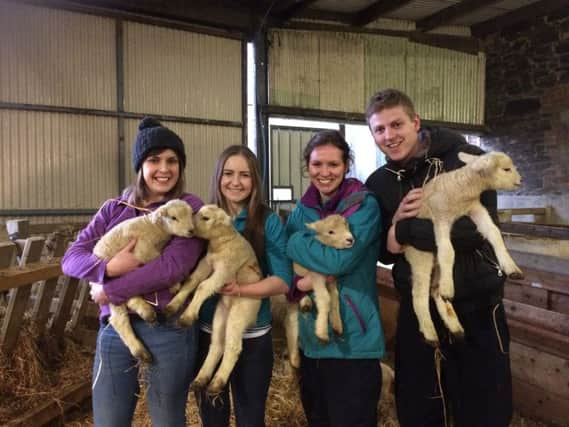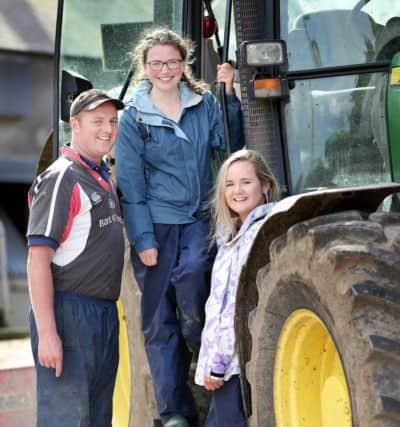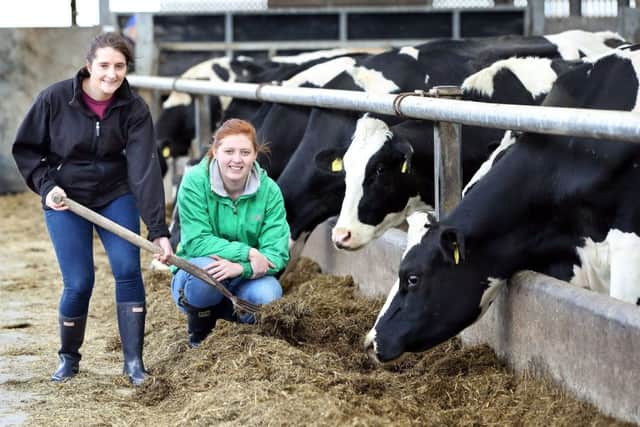Tomorrow's doctors are urged to '˜think rural'


In January 2016, four third year medical students had the chance leave the hospital wards behind for three weeks.
They were kindly hosted in Fermanagh by Maguiresbridge Surgery and Erne Veterinary Practice and in Cullybackey hosted by Oldstone Vets and Cullybackey Medical Practice. This time was complemented by visits with the Farm Family Health Checks Team, Rural Support, HSENI and most importantly out on farm with John Martin and Thomas Steele.
Advertisement
Advertisement
Module Co-ordinator Rebecca Orr explained: “We hoped the students could gain an insight into the rural population of Northern Ireland. We also wanted the three weeks to be busy, exciting and ‘good craic’ to really showcase life in the countryside and perhaps spark an interest in rural practice. It seems to have worked with two students now hoping to undertake rural placements in Scotland.”


UFU Deputy President, Ivor Ferguson said: “The UFU got involved with this initiate in an effort to help persuade doctors of the future that they are needed in rural areas. Despite the image of farming as a healthy occupation reality is very different. Modern day farming is physically and mentally demanding; it involves long hours, working in isolation and often coping with the frustration of poor profitability and red tape. Coupled with an aging farming population this has made health a big issue – made worse by the challenge of staffing rural medical centres. It is hoped this will encourage a greater interest in rural medicine and prehospital care in a rural environment.”
The students kept a very entertaining and thought provoking daily account of their experiences.
Here is what they had to say:
“I can’t say I’ve had much experience of dealing with cows – I love milk, and that’s about it. So the sight of me chasing 20 of them around a field in the middle of Fermanagh must have been a picture. I didn’t want to come across as a city girl, so I got stuck right in. Half way through the day, the snow set in. But farming doesn’t stop just because of the weather.” Rebecca Evans


Advertisement
Advertisement
“Sometimes in life you are given opportunities that you never thought were possible, or even believed existed. I have milked in the largest rotatory parlour in NI, cleaned out calf pens, fed calves, lambed a sheep, helped in a caesarean, castrated bulls, dehorned, scanned, took X rays, went to GP clinics, went to Loughry and Greenmount, I’ve been pictured in two newspapers, travelled the country, seen social farming, drove a gator, fed lambs, stayed in a B&B, stayed in a hotel, went to a mart, took BP’s and cholesterols and so much more. All of this whilst having the time of my life. I have loved every second of it and learned so much. I’ve learned lots about farming but mostly about people.” Victoria Livingstone
“Spending time with the vet has meant that I have spent time in some of the most beautiful parts of the country with some of the best people in it. I’ve been covered in dung, become an expert in reading cow tags and have become very skilled in writing at TB testing whilst wearing ski gloves. I’ve been absolutely foundered, but I’ve found a strange joy in being exposed to the elements. It’s a much simpler way of life. In the city, there is continuous pressure to achieve and obtain – to pursue success and accumulate material possessions. There was something so refreshing about being able to break into a country brogue (I’m going to have to retrain myself to stop saying ‘aye’ to every question) and being able to act without airs and graces. Where houses are true homes and where the kitchen may not be top of the range, but the food is wholesome and absolutely delicious.” Alice Quinn
“Despite coming from a rural background, being mainly based in Belfast over the last few years had led to me forgetting how special the countryside is. This module has allowed me to fall back in love with rural life! I have seen how hard farmers work, how much they prioritise their animals over themselves’ ‘For many, to visit their doctor is to admit defeat. Weakness is not a word endorsed by farmers. They just keep going.” Mark Riddell
At the end of the module, students present an evaluation on a range of topics, including financial stress and mental health in farmers, innovative ways to improve response times for rural dwellers, farming today and improving pre-hospital care for NI dwellers.